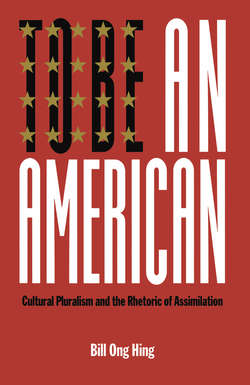Читать книгу To Be An American - Bill Ong Hing - Страница 8
На сайте Литреса книга снята с продажи.
Acknowledgments
ОглавлениеThe countless immigrant clients and families with whom I have worked over the past 25 years provided the primary impetus for the writing of this book. They are inspirational people who have taught me volumes about life. Most have been hard-working, decent, and law-abiding. Relatively few were criminals. I appreciate the opportunities I have had to get to know them; they have made my professional life worthwhile. I have encountered them in a variety of places: law offices, legal clinics, community presentations, the immigration court, and in detention facilities. They do not deserve the negative image that dominates much of today’s media.
I think of my clients often. I thought of them a few years back when I read that the most common name given to newborn boys in Los Angeles County was José. Given what we know about the demographic development in certain parts of the country like California, that fact was enlightening but no surprise. I was quite happy that the parents of all the new Josés born in Los Angeles County sought to record the name as José rather than as Joseph or Joe. Their action was a departure from what I experienced generations earlier.
When I was born in a small, predominantly Mexican American town in Arizona in 1949, my immigrant parents named me Billy—not William, or even Bill, but Billy. They chose this name because they had been told by doctors and others in the community that since they were in America they had to give their children American names and record our births with those names. They chose Billy for me because they had heard of other boys called Billy. Little did they know that most Billys had birth certificates under the name of William. Growing up, I had Mexican American friends whom I called Pancho, Pedro, Leonardo, Maria, and Reynaldo, whose birth certificates bore the names Frank, Peter, Leonard, Mary, and Ray. Although my birth certificate reads “Billy,” my parents, like all Chinese immigrants, gave me a Chinese name: Sun Yuen. Chinese names, like Native American names, have an intended meaning. Stupidly, on my part, I never bothered learning the meaning of my Chinese name until I was in high school. I found out that it means “new source”—a name that I rather like. We have come some distance since that era. Today, recording a child’s birth as José or Tseming or Kwame is not unusual.
I think of my clients when I drive around the state. Ironically, immigration authorities deport Latinos in California from places named Modesto, Salinas, San Francisco, San José, Los Angeles, Fresno, and San Diego.
Of course I think of my clients when I hear the rhetoric of today’s restrictionists. When neo-nativists think of refugees and immigrants the words that come to their minds are economic drain, welfare recipients, public school costs, non-English speakers, crime, separatism, conflict, and non-assimilation. But to those of us who know and work with, or who are ourselves, immigrants and refugees, thinking of refugees and immigrants conjures images of family, hard work, courage, cultural enrichment, and innovation.
When I first started working in immigration as a legal services immigration attorney in 1974, most of my clients were either Mexican or Chinese. Their names were Cabral, Ayalde, Lau, Chan and occasionally an oddity like my Cuban-Chinese client, Jacinto Cuan. But by the end of the 1970’s and into the 1980’s, the client list included Salvadorans, Guatemalans, Nigerians, Liberians, Iranians, Egyptians, Filipinos, Koreans, Vietnamese, Haitians, and South Africans. The names were different. Atanacio, Pineda, Mattoto, Ibrahim, Patel, Balian. Of course during this period, in addition to the Cardoza-Fonsecas and the Wongs that I represented, I also counselled the Walls and the McMullens and others from Canada and Europe including teenagers and young adults from places like Great Britain, France, Ireland, and Scandinavian countries looking for a free deportation ticket back home after money had run out here.
Many friends and colleagues have encouraged me to think about my clients and their impact on our society as I have proceeded on this project. I am deeply grateful for their counsel: Roberta Achtenberg, Ian Ayres, John Barton, John Burton, John Hart Ely, Ed Epstein, Lawrence Friedman, Tom Grey, J. D. Hokoyama, Kevin Johnson, Jerry López, Shauna Marshall, Bill McGowan, Joyce Hing McGowan, Miguel Méndez, Mary Morgan, Rose Matsui Ochi, José Padilla, Eva Jefferson Patterson, Nancy Pelosi, Drucilla Ramey, Cruz Reynoso, Bill Rojas, Bill Simon, John Tateishi, Kim Taylor-Thompson, Michael Wald, Patricia Williams, Lucie White, and Diane Wong. Friends at the Immigrant Legal Resource Center have continued to inspire my work: Kathy Brady, Eric Cohen, Sister Martha Garcia, Susan Lydon, Nancy Mowery, Rebecca Rivera, Anaya Rose, and Mark Silverman. Several students helped along the way: Michelle Alvarez, Jon Blazer, Stephen Carpenter, Daina Chiu, Selena Dong, Shubha Ghosh, David Kazanjian, Margaret Lin, Stephanie Martz, John Russ, Eric Talley, and Rufus Whitley. My administrative assistant, Yvonne Yazzie, has been a constant resource. And I am sincerely indebted to the New York University Press editor-in-chief, Niko Pfund, and the series editors, Richard Delgado and Jean Stefancic, for their trust and confidence in me.
Of course none of my work is possible or worthwhile without the love, support, encouragement, example, and understanding of my wife, Lenora, and our children, Eric, Sharon, and Julianne. They are my spirit, bringing perspective, balance, sanity, and sustenance to my life.
